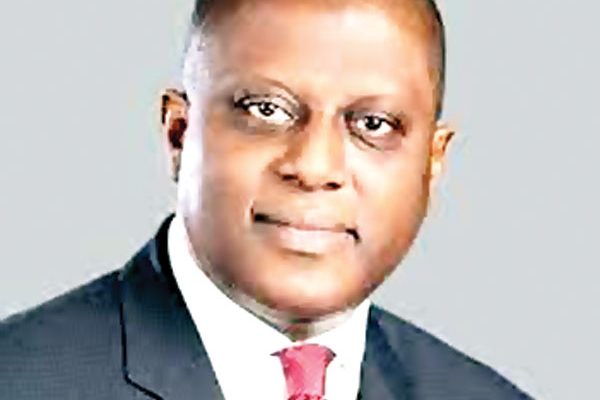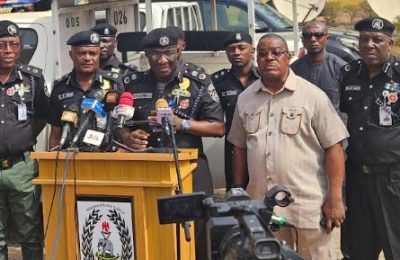
Data from the Central Bank of Nigeria (CBN) has shown that the past 16 months since President Bola Tinubu took office, Nigeria’s economy has experienced significant challenges that do not support the arguments by the World Bank that reform efforts of the current administration is yielding positive results and should not be reversed.
Specifically, key economic indicators, including inflation, exchange rate and interest rates, have shown marked deterioration, painting a bleak picture of the nation’s economic health.

Analysts agree that the period has been defined by rising consumer prices, a plunging naira, escalating borrowing costs and stagnant oil prices.
The World Bank recently warned that reversing the reforms by President Tinubu’s administration will spell doom for Nigeria.
Ndiame Diop, World Bank Country Director for Nigeria, gave the warning at the launch of the Nigeria Development Update (NDU) report in Abuja.
According to him, Nigeria needs to stick to the plan and keep moving forward as turning back or opposing the reforms would only make things worse.
However, in a chat with Nigerian Tribune, the Chief Executive Officer (CEO) of The CFG Advisory, Adetilewa Adebajo, did not subscribe to the World Bank position, saying: “We do not agree with the World Bank’s position.”
Explaining reasons for disagreeing with the multilateral institution, Adebajo regretted that Nigerians are already tired with the economic reform programme of President Tinubu, stressing that the credibility of the reform programme is now in question and in a state of quagmire.
He recalled that the same World Bank forecasts Nigeria to be the third most populous country in the world by 2050, with an annual population growth rate of 2.6 percent over the next 10 years, but at present, nothing significant shows the country is preparing to take care of this upsurge. Instead, Nigeria is now the fourth largest economy in Africa, sliding from the first position it occupied in 2022.
The country’s Foreign Direct Investment (FDI, according to him, is at all-time lows of under $1 billion compared to $3.3 billion as of 2022.
He said about 135 million Nigerians are in the poverty trap with 40 percent unemployment and very low job creation and industrial productivity.
He said: “We are currently in an economic reform fatigue quagmire and the failure of the social intervention programme has exacerbated the situation.
“Inability to implement social intervention program to cushion the impact of the reforms, corruption allegations against the minister in charge and fiscal indiscipline has led to disenchantment among the populace.
“It is now evident that the cart was put before the horse, as reforms were implemented too quickly, devoid of the adequate planning and resources, leading to the unintended consequences. Credibility of the reform programme is now in question and in a state of quagmire. The Federal Government has to urgently hit the reset button to get the reforms back on track.
“We advised Nigerians in January to be prepared to endure an 18 months economic recovery period that will be accompanied by a high interest rate regime to tame inflation and foreign exchange (FX) volatility. As year-end approaches, the gap between FX markets has narrowed, volatility abated and we have seen the return of the Dutch Auction.
“Our benchmark exchange rate recommendation for year-end 2024 has been validated by events and remains at N1,500 to 1,800 to the dollar.”
The World Bank also said Nigeria, Angola and Sierra Leone, with double-digit inflation and weakened domestic currencies, will maintain a high interest rate for a long period and may even increase it.
In September, the CBN raised the benchmark interest rate by 50 basis points to 27.25 percent from 26.75 percent in response to the continued inflationary conditions in the economy.
According to Adebajo, in 2011 and 2014, the Nigerian Gross Domestic Product (GDP) grew in excess of eight percent and in both years, inflation was within a band of 11-13 percent and interest rates at 12-15 percent.
“Our analysis and the historical data confirm that when inflation and interest rates are within this band, high GDP growth rates are assured, but when they are higher as it is today in Nigeria, growth is slow which is a pointer for monetary policy formulation,” he said.
He added that the early August two-day strike and protest that shut down the nation is a wake-up call for the government.
In proffering solution, the finance and economic expert said: “The Federal Government needs to urgently sell down to at least 49 percent of its interest in the 74 licensed concession assets in a bid to raise $50 billion to improve government finances, restructure and recapitalise NNPC balance sheet.
“It must also consolidate all of NNPC oil forwards contracts into a structured debt instrument for ease of management, better rates, transparency and accountability.
“With this in place and other bottlenecks removed, Nigeria can restore investments into the oil and gas industry, which has declined from the highs of $22 billion in 2009 and 2014 to less than $3 billion in 2024. This is in a bid to ramp up production to 2.5 million barrels per day for revenue sustainability and FX availability.”
President Tinubu’s administration has been met with widespread criticism, with many Nigerians expressing disappointment and frustration.
A Port-Harcourt-based legal practitioner, Barrister Nnamdi Oyichukwu, alleged that the government is being “disastrous, calamitous and socio-economically rudderless, exacerbating excruciating pains, misery, hunger, starvation, poverty and endless hopelessness among citizens.”
Since taking office in May 2023, President Tinubu’s leadership has faced numerous challenges, including insecurity, insurgency and separatist agitations. The country’s economic struggles have also persisted, with many Nigerians struggling to make ends meet.
Banditry, kidnappings and terrorist attacks continue to plague the nation, particularly in the Northwest and Northeast regions.
Poverty, hunger and starvation remain pervasive, with many Nigerians struggling to access basic necessities amidst tensions in the Southeast region that continue to simmer, posing a significant challenge to national unity.
Perhaps the most alarming economic indicator over this period has been the steep rise in inflation. Between May 2023 and September 2024, Nigeria’s inflation rate worsened by 46 percent, rising from 22.41 percent to 32.70 percent. This surge has placed a heavy burden on the average Nigerian, as the cost of essential goods and services has skyrocketed. Food prices, transportation costs and energy bills have all increased significantly, with many households struggling to make ends meet.
Also, an economist and former insurance broker with the defunct Oceanic Insurance, Mr Damian Duke Ohuakanwa, told Nigerian Tribune that the World Bank is not representing the interest of Nigerians and that, it is unfortunate that the Tinubu-led administration is interested in the Briton Woods institution rather than the plight of Nigerians.
According to him, roads in Nigeria are replete with potholes and have remained impassable for so many years.
A government that has the interest of the citizens at heart would not ignore these roads and begin to embark on a phony project like Lagos-Calabar coastal road with a whopping N2.8 trillion.
“This amount can fix several federal roads in the country that will help the citizens in their daily economic activities and warm the government into their hearts,” he stated.
He added: “As we speak, in the next few weeks, the government will hand out temporary palliatives like subsidising transportation during the Yuletide season to appease travellers without significant long-time impact on the living standards of citizens.
In the same way, Senator Abubakar Yusuf, former senator of the eighth and ninth assembly, says economic indicators and market fundamentals have to be addressed because even as the monetary authorities are struggling with high liquidity, the World Bank itself is saying that it will take a long period of interest rate increases to be able to attack the liquidity in the system. This is not minding the adverse effects of high interest rate regime in an economy.
He disagreed with those advising the Federal Government to approach the International Monetary Fund (IMF) for loan, wondering what exchange rate the dollars would be subjected to if eventually secured in an environment of uncertainty in the exchange rate of the local currency.
According to Yusuf, the Federal Government should do the needful by first getting the correct value of the country’s export of crude oil.
“Are we getting that? We are not getting that. I was in the Senate in the eighth assembly. In the ninth assembly, we carried out investigation, on presuming inspection of export and repatriation of export proceeds by the multinational oil companies as per the law of this country. They are not repatriating export proceeds,” he emphasised.
According to Yusuf, even the non-oil companies are not repatriating, but the government should insist on these people to repatriate.
“On the other side, they say, Well, if you insist, these people are going, I mean, the investment will fly out of this country. Who says so? The multinational companies are saying that they are going out of this country because of bureaucracy and because of redtapism. But as far as we are concerned, in this country, the fundamental thing is that the law must apply. Let them repatriate export proceeds and the dollars will flow,” Yusuf said while also calling for more taxes from the rich and stoppage of various subsidies that favour only a few rich Nigerians.
He said the citizens need to look inwards and consume local. The government and individuals do not buy locally assembled innocent vehicles and those being assembled in Lagos, instead, they import expensive vehicles, wristwatches, textile, thereby increasing the employment of other countries and leaving local alternatives.
“We need to improve, even on our tariffs on all these luxuries that we import in this country,” he emphasised.
The naira has been listed as one of the worst-performing currencies in Sub-Saharan Africa for 2024. This is according to the World Bank’s latest Africa’s Pulse report.
The report revealed that by the end of August 2024, the naira had depreciated by about 43 percent year-to-date. This positioned it alongside the Ethiopian birr and South Sudanese pound as the region’s weakest currencies.
The depreciation is attributed to increasing demand for U.S. dollars in the parallel market, limited dollar inflows and delays in foreign exchange disbursements by the CBN.
Available records show that depreciation of the naira has been one of the most dramatic economic developments over the last 16 months.
In May 2023, the exchange rate stood at N461.76 to the US dollar. By September 2024, the naira had plummeted to N1,601.53 to the dollar, representing a 247 percent depreciation.
This sharp decline has significantly impacted Nigeria’s ability to import goods and services, further fuelling inflation and increasing the cost of doing business.
In response to the rising inflation and the depreciation of the naira, the CBN pursued a policy of monetary tightening. As a result, interest rates have risen sharply, from 18.5 percent in May 2023 to 27.25 percent in September 2024, marking a 47 percent increase. While this move, according to analysts, is intended to curb inflation by reducing the money supply, it has come at the cost of higher borrowing costs for both businesses and individuals.
The increase in interest rates has had a significant impact on businesses, particularly small and medium-sized enterprises (SMEs), which rely heavily on loans to fund their operations. Many businesses are finding it difficult to access credit and those that do are faced with higher repayment costs, which are eroding profit margins.
The higher cost of borrowing is also slowing investment in critical sectors such as manufacturing, agriculture and real estate.
For individuals, higher interest rates mean increased mortgage and loan repayments, placing additional strain on household finances.
Further, despite Nigeria being Africa’s largest oil producer, oil and gas experts say that crude oil prices have remained largely stagnant over the last 16 months. In May 2023, the price of crude oil stood at $74.75 per barrel. By September 2024, it had edged up slightly to $75.50 per barrel, representing less than one percent increase. This minimal change in global oil prices has limited Nigeria’s ability to boost its foreign exchange earnings, particularly at a time when the naira is depreciating so rapidly.
One area of modest improvement has been in oil production. Nigeria’s daily crude oil output increased from 1.32 million barrels per day in May 2023 to 1.5 million barrels per day in September 2024, marking a 13.6 percent increase. While this growth is a positive sign, it falls short of Nigeria’s production potential, which is closer to two million barrels per day.
Several factors have hindered the country’s ability to reach this target, including oil theft, which has been rampant in the Niger Delta region. Additionally, ageing infrastructure and a lack of investment in new oil projects have limited the country’s ability to increase production significantly.
CRITICAL MARKET INDICATORS — LAST 16 MONTHS
Indicators May 2023 September 2024
Inflation 22.41% 32.70%
Exchange Rate $1/461.76 $1/₦1,601.528
Interest rate 18.5% 27.25%
Crude oil price $74.75/barrel $75.5 per barrel
Crude oil production 1.32m/barrel 1.5m/barrel
READ ALSO: Why we rejected IPPIS — ASUU







